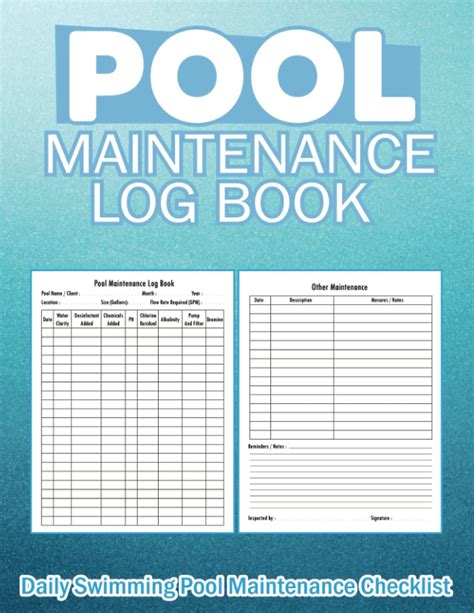Pool Cleaning Insurance

In the world of professional pool maintenance, unexpected incidents can arise, highlighting the critical importance of insurance coverage. This comprehensive guide delves into the intricacies of pool cleaning insurance, offering an in-depth analysis of its various aspects and the benefits it brings to the industry. From understanding the risks unique to pool cleaning businesses to exploring the specific insurance options available, we aim to provide an expert overview that assists professionals in making informed decisions about their insurance needs.
Understanding the Risks: A Necessity for Pool Cleaning Professionals

Pool cleaning is a multifaceted industry, and with its diverse range of tasks, it exposes professionals to a myriad of potential risks. These risks are not just limited to the obvious physical dangers associated with working in and around water but also encompass a broad spectrum of liability concerns.
Physical Risks and Their Implications
The very nature of pool cleaning involves close proximity to water, making professionals susceptible to accidents such as slips, trips, and falls. Additionally, the use of specialized equipment, often in tight spaces, increases the likelihood of injuries. These incidents can result in substantial medical expenses and, in severe cases, may even lead to legal repercussions.
Moreover, the physical demands of the job, which often include heavy lifting and repetitive tasks, can contribute to a higher risk of work-related injuries and illnesses. Such occurrences not only affect the well-being of the workers but also disrupt the smooth operation of the business, potentially leading to financial losses.
Liability Concerns: An Overlooked Aspect
Beyond the physical risks, pool cleaning professionals face a host of liability concerns. These include the potential for property damage, whether it’s a pool wall accidentally breached during cleaning or an issue with the pool’s drainage system that causes water damage to the surrounding area.
Another significant liability risk is personal injury to clients or their guests. For instance, a client could slip on a wet surface around the pool after cleaning, leading to serious injuries. Such incidents can result in costly legal battles and damage the reputation of the business.
Furthermore, the use of chemicals in pool cleaning poses another set of risks. Improper handling, storage, or disposal of these chemicals can lead to environmental hazards and health issues. In such cases, the pool cleaning business may be held liable for any resulting damages.
The Comprehensive Guide to Pool Cleaning Insurance

Given the diverse risks associated with pool cleaning, it is imperative for professionals in this industry to have adequate insurance coverage. Pool cleaning insurance serves as a financial safety net, protecting businesses from the potentially devastating financial consequences of accidents and other unforeseen events.
Coverage Options: Tailored to Pool Cleaning Businesses
Pool cleaning insurance offers a range of coverage options, each designed to address specific risks inherent to the industry. These include:
- General Liability Insurance: This type of insurance provides coverage for bodily injury and property damage claims that may arise from pool cleaning operations. It can cover incidents such as a client slipping on a wet surface after cleaning or property damage caused by a faulty cleaning procedure.
- Commercial Property Insurance: This coverage protects the physical assets of the business, including equipment, vehicles, and any office space. It ensures that in the event of damage or loss, the business can quickly recover and continue operations.
- Workers' Compensation Insurance: This insurance is vital for protecting both the business and its employees. It covers medical expenses and lost wages for employees who sustain work-related injuries or illnesses, providing financial support during their recovery.
- Professional Liability Insurance: Also known as errors and omissions (E&O) insurance, this coverage is designed to protect pool cleaning businesses from claims of negligence or incompetence. It can cover legal fees and any compensation awarded in such cases, providing a vital safety net for businesses.
- Chemical Liability Insurance: Given the use of chemicals in pool cleaning, this insurance is crucial. It provides coverage for any bodily injury or property damage claims resulting from the improper handling, storage, or disposal of chemicals.
Benefits and Advantages of Pool Cleaning Insurance
The benefits of pool cleaning insurance are extensive and can significantly impact the financial health and stability of a business. Here are some key advantages:
- Financial Protection: Pool cleaning insurance offers a vital financial safety net, protecting businesses from the potentially ruinous costs associated with accidents, injuries, or property damage claims.
- Peace of Mind: With comprehensive insurance coverage, pool cleaning professionals can focus on their core business activities without the constant worry of unforeseen risks and their financial implications.
- Enhanced Reputation: Insurance can be a powerful tool for building and maintaining a reputable business image. It demonstrates a commitment to safety and responsibility, which can enhance client trust and confidence.
- Attracting and Retaining Clients: Many clients now recognize the importance of insurance and often prefer to work with businesses that have comprehensive coverage. Having insurance can therefore be a key factor in attracting new clients and retaining existing ones.
- Compliance with Legal and Industry Requirements: Certain types of insurance, such as workers' compensation, are often mandated by law or industry regulations. Ensuring compliance through adequate insurance coverage can help businesses avoid legal penalties and maintain a good standing in the industry.
Case Study: The Impact of Insurance in Pool Cleaning
To illustrate the importance of pool cleaning insurance, let’s consider a real-world scenario. Imagine a pool cleaning business that specializes in residential pool maintenance. One day, while cleaning a pool, a technician accidentally damages a pool light, resulting in a significant repair bill for the homeowner. Without insurance, the business would be fully liable for this cost, potentially leading to financial strain or even bankruptcy.
However, with comprehensive general liability insurance, the scenario plays out differently. The insurance policy covers the cost of repairing the pool light, providing financial relief to the business. Furthermore, the insurance company may also assist with any legal processes or negotiations with the homeowner, streamlining the resolution process and protecting the business's reputation.
Navigating the Complex World of Pool Cleaning Insurance
Understanding and navigating the complex landscape of pool cleaning insurance is a critical skill for professionals in this industry. It involves a careful assessment of risks, a thorough understanding of the various insurance options, and the ability to select coverage that best suits the specific needs of the business.
Key Considerations for Pool Cleaning Professionals
When evaluating insurance options, pool cleaning professionals should consider the following:
- Risk Assessment: Conduct a thorough evaluation of the specific risks associated with their business operations. This includes identifying potential hazards, the likelihood of accidents, and the potential financial impact of such incidents.
- Coverage Limits: Ensure that the chosen insurance policy provides adequate coverage limits to address the potential risks. Coverage limits that are too low may not provide sufficient protection in the event of a significant loss.
- Policy Exclusions: Carefully review the exclusions in any insurance policy. Exclusions are situations or events that are not covered by the policy. Being aware of these exclusions can help businesses make informed decisions and potentially negotiate for additional coverage where needed.
- Cost-Benefit Analysis: While insurance is a vital aspect of risk management, it's important to strike a balance between the cost of insurance and the benefits it provides. A comprehensive cost-benefit analysis can help businesses determine the most suitable insurance coverage that aligns with their financial capabilities and risk appetite.
- Insurance Provider Reputation: Choose an insurance provider with a strong reputation for financial stability and customer service. A reputable insurer can provide better support and guidance in navigating the complexities of insurance claims.
The Role of Insurance Brokers in Pool Cleaning
Insurance brokers can be invaluable partners for pool cleaning businesses. With their expertise in the insurance industry, they can offer tailored advice and guidance to help businesses navigate the complex world of insurance.
Brokers can provide an objective assessment of the business's risks and recommend appropriate insurance coverage. They can also negotiate with insurers to secure the best possible rates and terms, ensuring that businesses get the most value for their insurance spend. Additionally, brokers often have access to a wide range of insurance providers, allowing them to shop around for the best coverage options.
Conclusion: A Safer, More Secure Future with Pool Cleaning Insurance
In conclusion, pool cleaning insurance is an indispensable tool for professionals in the industry. It provides a vital layer of protection against the myriad of risks associated with pool cleaning, from physical injuries to liability concerns. By understanding these risks and the available insurance options, pool cleaning businesses can make informed decisions to safeguard their operations, their employees, and their clients.
As the pool cleaning industry continues to evolve, so too must the insurance coverage that supports it. Staying informed and proactive about insurance needs is key to ensuring a safe, secure, and sustainable future for pool cleaning businesses.
What is the average cost of pool cleaning insurance for small businesses?
+
The cost of pool cleaning insurance can vary significantly depending on a range of factors, including the size and location of the business, the scope of operations, and the specific insurance coverage needed. On average, small pool cleaning businesses can expect to pay anywhere from 500 to 2,000 per year for general liability insurance. However, this cost can increase or decrease based on the unique needs and risks associated with each business.
Are there any specific insurance requirements for pool cleaning businesses operating in certain states or regions?
+
Yes, some states or regions may have specific insurance requirements for pool cleaning businesses. These requirements often include general liability insurance and workers’ compensation insurance. It’s crucial for businesses to be aware of and comply with these regulations to avoid legal penalties and maintain a good standing in the industry.
How often should pool cleaning businesses review their insurance policies and coverage?
+
Pool cleaning businesses should review their insurance policies and coverage at least once a year, or whenever there are significant changes to their operations, staff, or equipment. Regular reviews ensure that the insurance coverage remains adequate and aligned with the evolving needs and risks of the business.


